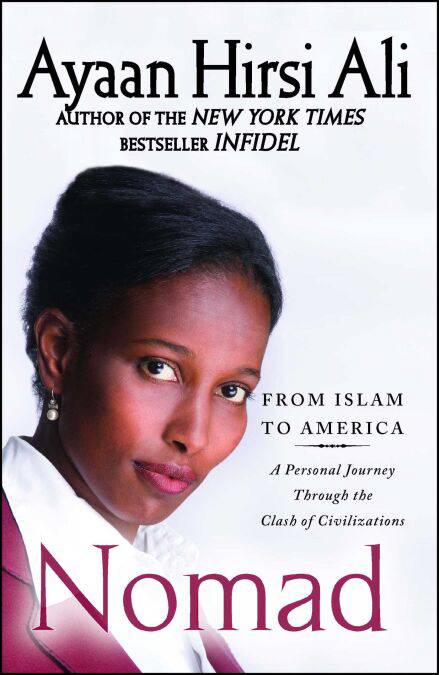
- Afhalen na 1 uur in een winkel met voorraad
- Gratis thuislevering in België vanaf € 30
- Ruim aanbod met 7 miljoen producten
- Afhalen na 1 uur in een winkel met voorraad
- Gratis thuislevering in België vanaf € 30
- Ruim aanbod met 7 miljoen producten
Zoeken
Nomad E-BOOK
From Islam to America: A Personal Journey Through the Clash of Civilizations
Ayaan Hirsi Ali
E-book | Engels
€ 15,65
+ 15 punten
Uitvoering
Omschrijving
Internationally bestselling author Ayaan Hirsi Ali tells the stirring story of her search for a new life in America, recounting dramatic stories of her family and the challenges they faced adapting to Western society as Muslim immigrants.
Ayaan Hirsi Ali captured the world’s attention with Infidel, her compelling coming-of-age memoir, which spent thirty-one weeks on the New York Times bestseller list. Now, in Nomad, Hirsi Ali tells of coming to America to build a new life, an ocean away from the death threats made to her by European Islamists, the strife she witnessed, and the inner conflict she suffered. It is the story of her physical journey to freedom and, more crucially, her emotional journey to freedom—her transition from a tribal mind-set that restricts women’s every thought and action to a life as a free and equal citizen in an open society. Through stories of the challenges she has faced, she shows the difficulty of reconciling the contradictions of Islam with Western values.
In these pages Hirsi Ali recounts the many turns her life took after she broke with her family, and how she struggled to throw off restrictive superstitions and misconceptions that initially hobbled her ability to assimilate into Western society. She writes movingly of her reconciliation, on his deathbed, with her devout father, who had disowned her when she renounced Islam after 9/11, as well as with her mother and cousins in Somalia and in Europe.
Nomad is a portrait of a family torn apart by the clash of civilizations. But it is also a touching, uplifting, and often funny account of one woman’s discovery of today’s America. While Hirsi Ali loves much of what she encounters, she fears we are repeating the European mistake of underestimating radical Islam. She conveys an urgent message and mission—to inform the West of the extent of the threat from Islam, both from outside and from within our open societies. A celebration of free speech and democracy, Nomad is an important contribution to the history of ideas, but above all a rousing call to action.
Ayaan Hirsi Ali captured the world’s attention with Infidel, her compelling coming-of-age memoir, which spent thirty-one weeks on the New York Times bestseller list. Now, in Nomad, Hirsi Ali tells of coming to America to build a new life, an ocean away from the death threats made to her by European Islamists, the strife she witnessed, and the inner conflict she suffered. It is the story of her physical journey to freedom and, more crucially, her emotional journey to freedom—her transition from a tribal mind-set that restricts women’s every thought and action to a life as a free and equal citizen in an open society. Through stories of the challenges she has faced, she shows the difficulty of reconciling the contradictions of Islam with Western values.
In these pages Hirsi Ali recounts the many turns her life took after she broke with her family, and how she struggled to throw off restrictive superstitions and misconceptions that initially hobbled her ability to assimilate into Western society. She writes movingly of her reconciliation, on his deathbed, with her devout father, who had disowned her when she renounced Islam after 9/11, as well as with her mother and cousins in Somalia and in Europe.
Nomad is a portrait of a family torn apart by the clash of civilizations. But it is also a touching, uplifting, and often funny account of one woman’s discovery of today’s America. While Hirsi Ali loves much of what she encounters, she fears we are repeating the European mistake of underestimating radical Islam. She conveys an urgent message and mission—to inform the West of the extent of the threat from Islam, both from outside and from within our open societies. A celebration of free speech and democracy, Nomad is an important contribution to the history of ideas, but above all a rousing call to action.
Specificaties
Betrokkenen
- Auteur(s):
- Uitgeverij:
Inhoud
- Aantal bladzijden:
- 304
- Taal:
- Engels
Eigenschappen
- Productcode (EAN):
- 9781439171820
- Verschijningsdatum:
- 17/05/2010
- Uitvoering:
- E-book
- Beveiligd met:
- Adobe DRM
- Formaat:
- ePub

Alleen bij Standaard Boekhandel
+ 15 punten op je klantenkaart van Standaard Boekhandel
Beoordelingen
We publiceren alleen reviews die voldoen aan de voorwaarden voor reviews. Bekijk onze voorwaarden voor reviews.











